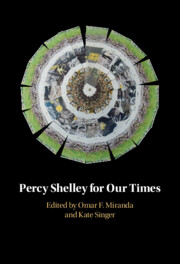Book contents
- Percy Shelley for Our Times
- Reviews
- Percy Shelley for Our Times
- Copyright page
- Contents
- Notes on Contributors
- Acknowledgments
- Abbreviations
- Introduction
- 1 Shelley, Treaty-Making, and Indigenous Poetry
- 2 Waiting for the Revolution
- 3 “A Chamæleonic Race”
- 4 Dream Defenders and the Inside Songs
- 5 Radical Suffering
- 6 Loathsome Sympathy
- 7 Hopeless Romanticism
- 8 Percy Shelley’s Sad Exile
- 9 Shelley in the Overgrowth
- 10 Creatrix Witches, Nonbinary Creatures, and Shelleyan Transmedia
- 11 Action at a Distance
- 12 Educating the Imagination/Defending Shelley Defending
- Further Reading
- Index
9 - Shelley in the Overgrowth
Published online by Cambridge University Press: 07 March 2024
- Percy Shelley for Our Times
- Reviews
- Percy Shelley for Our Times
- Copyright page
- Contents
- Notes on Contributors
- Acknowledgments
- Abbreviations
- Introduction
- 1 Shelley, Treaty-Making, and Indigenous Poetry
- 2 Waiting for the Revolution
- 3 “A Chamæleonic Race”
- 4 Dream Defenders and the Inside Songs
- 5 Radical Suffering
- 6 Loathsome Sympathy
- 7 Hopeless Romanticism
- 8 Percy Shelley’s Sad Exile
- 9 Shelley in the Overgrowth
- 10 Creatrix Witches, Nonbinary Creatures, and Shelleyan Transmedia
- 11 Action at a Distance
- 12 Educating the Imagination/Defending Shelley Defending
- Further Reading
- Index
Summary
This chapter examines Shelley’s images of the collapse of human civilizations and the colonization of their ruins by a darkly resurgent nature. In particular, it places Shelley’s fascination with civilizational collapse and natural overgrowth in the context of recent conceptions of “rewilding.” It argues that “rewilding” as currently conceived by its leading advocates remains an irreducibly human project, whereas Shelleyan overgrowth conceives of a resurgent nature that both occludes and darkly perpetuates the ruins of humanity. A number of key moments in Shelley’s work are central here: his description in his preface to Prometheus Unbound of the situation of the composition of that poem; a fragment of 1818, “Flourishing vine, whose kindling clusters glow”; and the description in Adonais of “Desolation’s bones.” Through close readings of these episodes, the chapter shows that Shelleyan overgrowth represents what we may call a “dark rewilding” – which is for us, as it was for Shelley, a future that human civilization increasingly appears to anticipate. Shelley anticipates many of the conceptual and ethical complexities of today’s rewilding, articulating instead a more ambivalent, less obviously hopeful conception of overgrowth as the eerie perpetuation of the ruins of a disappeared humanity.
- Type
- Chapter
- Information
- Percy Shelley for Our Times , pp. 195 - 213Publisher: Cambridge University PressPrint publication year: 2024



